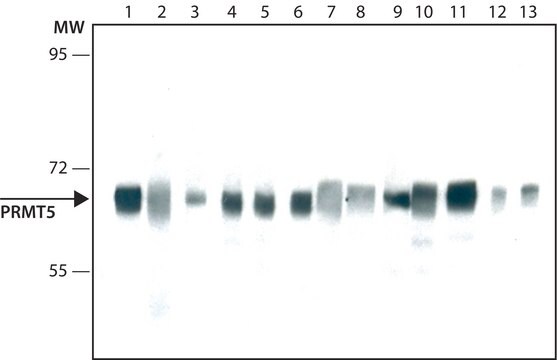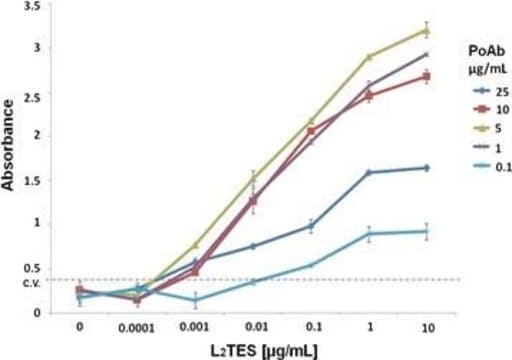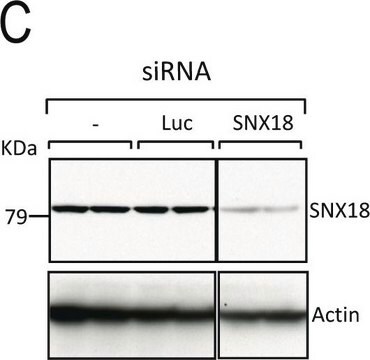P7899
Anti-Peroxidase antibody produced in rabbit
fractionated antiserum, lyophilized powder
Synonym(s):
Rabbit Anti HRP
Sign Into View Organizational & Contract Pricing
All Photos(1)
About This Item
Recommended Products
biological source
rabbit
Quality Level
conjugate
unconjugated
antibody form
fractionated antiserum
antibody product type
primary antibodies
clone
polyclonal
form
lyophilized powder
species reactivity
horseradish
technique(s)
indirect ELISA: 1:100,000-1:200,000
storage temp.
2-8°C
target post-translational modification
unmodified
General description
Antiserum is determined to be immunospecific for horseradish peroxidase and does not inhibit the enzymatic activity of the peroxidase.
Peroxidase is a hemoprotein.
The fractionation procedure yields primarily the immunoglobulin fraction of antiserum. If necessary, the fractionated antiserum is adsorbed using solid phase techniques. Antiserum is determined to be immunospecific by immunoelectrophoresis (IEP), against purified and crude horseradish peroxidase
The gel is stained with DAB (diaminobenzidine) to ensure that the antibody does not inhibit the enzymatic activity of the peroxidase. Identity and purity of the antibody is established by immunoelectrophoresis. Electrophoresis of the antibody preparation followed by diffusion against anti-rabbit IgG and anti-rabbit whole serum results in single arcs of precipitation in the γ region
Each mL will precipitate a minimum of 0.25 mg of peroxidase at equivalence. May be used to stain axons and synaptic terminals in Drosophila embryo fillets.
The gel is stained with DAB (diaminobenzidine) to ensure that the antibody does not inhibit the enzymatic activity of the peroxidase. Identity and purity of the antibody is established by immunoelectrophoresis. Electrophoresis of the antibody preparation followed by diffusion against anti-rabbit IgG and anti-rabbit whole serum results in single arcs of precipitation in the γ region
Each mL will precipitate a minimum of 0.25 mg of peroxidase at equivalence. May be used to stain axons and synaptic terminals in Drosophila embryo fillets.
Immunogen
Purified peroxidase from horseradish
Application
Anti-Peroxidase antibody produced in rabbit has been used in:
- immunoblot assays
- enzyme-linked-immunosorbent assay (ELISA)
- immunoprecipitation
Biochem/physiol Actions
Peroxidase helps in catalyzing the oxidation of a number of substrates with the help of hydrogen peroxide.
Physical form
Lyophilized from 0.01 M phosphate buffered saline, pH 7.2
Reconstitution
Reconstitute with deionized water.
Analysis Note
Specificity is determined by immunoelectrophoresis using a crude peroxidase extract.
Disclaimer
Unless otherwise stated in our catalog or other company documentation accompanying the product(s), our products are intended for research use only and are not to be used for any other purpose, which includes but is not limited to, unauthorized commercial uses, in vitro diagnostic uses, ex vivo or in vivo therapeutic uses or any type of consumption or application to humans or animals.
Not finding the right product?
Try our Product Selector Tool.
Storage Class Code
11 - Combustible Solids
WGK
WGK 3
Flash Point(F)
Not applicable
Flash Point(C)
Not applicable
Personal Protective Equipment
dust mask type N95 (US), Eyeshields, Gloves
Certificates of Analysis (COA)
Search for Certificates of Analysis (COA) by entering the products Lot/Batch Number. Lot and Batch Numbers can be found on a product’s label following the words ‘Lot’ or ‘Batch’.
Already Own This Product?
Find documentation for the products that you have recently purchased in the Document Library.
Customers Also Viewed
Koto Furotani et al.
PloS one, 13(9), e0204048-e0204048 (2018-09-19)
APP (amyloid precursor protein), the causative molecule of Alzheimer's disease, is synthesized in neuronal cell bodies and subsequently transported to synapses. We previously showed that the yata gene is required for the synaptic transport of the APP orthologue in Drosophila
Mary Lynn Dear et al.
Development (Cambridge, England), 143(1), 75-87 (2015-11-26)
Synaptogenesis requires orchestrated intercellular communication between synaptic partners, with trans-synaptic signals necessarily traversing the extracellular synaptomatrix separating presynaptic and postsynaptic cells. Extracellular matrix metalloproteinases (Mmps) regulated by secreted tissue inhibitors of metalloproteinases (Timps), cleave secreted and membrane-associated targets to sculpt
Chilling injury and peroxidase activity changes in ?Fortune? mandarin fruit during low temperature storage
El-HF, et al.
Bulgarian Journal of Plant Physiology, 29(1-2), 44-54 (2003)
Oxidative stress
Biochemical Ecotoxicology. Principles and Methods (2014)
Prachi Jain et al.
PloS one, 13(5), e0197132-e0197132 (2018-05-17)
Present work focuses on tissue and concentration-dependent effect of nitric oxide (NO) on the modulation of cytosolic peroxidase (POD; EC 1.11.1.7) activity in 2-day old etiolated sunflower (Helianthus annuus L.) seedlings. Exogenously supplied NO (in the form of sodium nitroprusside
Our team of scientists has experience in all areas of research including Life Science, Material Science, Chemical Synthesis, Chromatography, Analytical and many others.
Contact Technical Service







